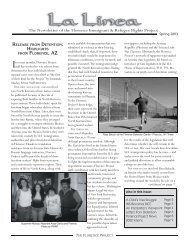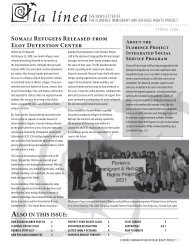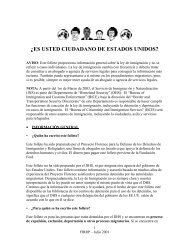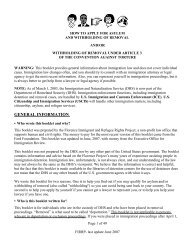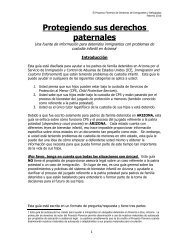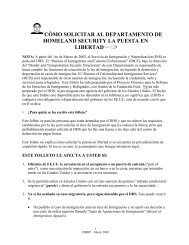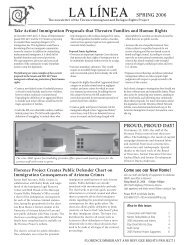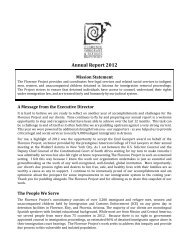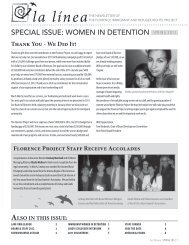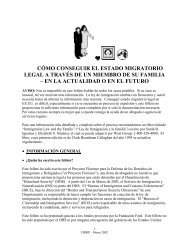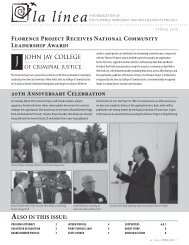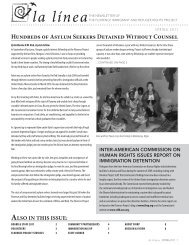quick reference chart and annotations for determining immigration ...
quick reference chart and annotations for determining immigration ...
quick reference chart and annotations for determining immigration ...
Create successful ePaper yourself
Turn your PDF publications into a flip-book with our unique Google optimized e-Paper software.
Immigrant Legal Resource Center, Florence Immigrant <strong>and</strong> Refugee Rights Project,<br />
Maricopa County Public Defender August 2012<br />
attempt or conspiracy, a plea to attempt might prevent deportability under the ground relating to a<br />
conviction <strong>for</strong> stalking, or a crime of child abuse, neglect or ab<strong>and</strong>onment. See 8 USC § 1227(a)(2)(E)<br />
<strong>and</strong> Note: Domestic Violence.<br />
Attempt is included in the definition of a conviction of a crime of domestic violence, another<br />
basis <strong>for</strong> deportation under this section, because attempt is included in the definition of ‘crime of<br />
violence’ at 18 USC § 16. However, a plea to attempt (or conspiracy or facilitation) still may help<br />
prevent the offense from becoming a crime of violence if the plea makes the offense a misdemeanor.<br />
Under 18 USC § 16(a), a misdemeanor is a crime of violence only if the offense has as an element the<br />
intent to threaten or commit to use violent <strong>for</strong>ce, while a felony that carries an inherent risk that <strong>for</strong>ce will<br />
be used is a crime of violence. By reducing an offense to a misdemeanor, attempt thus can disqualify<br />
some offenses from being crimes of violence, <strong>and</strong> there<strong>for</strong>e crimes of domestic violence.<br />
Note that a plea to “attempt” will always involve an intentional mens rea <strong>and</strong> thus preclude the<br />
benefits of a plea to a statute that is divisible because it includes a lower mens rea. United States v.<br />
Gomez-Hern<strong>and</strong>ez, 680 F.3d 1171, 1176 (9th Cir. 2012) (“it is well-settled that attempted aggravated<br />
assault under Arizona law covers only intentional conduct”) (citing State v. Kiles, 175 Ariz. 358, 857 P.2d<br />
1212, 1224 (1993) (“[A]ttempt is a specific intent crime <strong>and</strong> by definition involves intentional conduct.”).<br />
For instance, in order to avoid a crime of violence or a crime of domestic violence under ARS § 13-<br />
1203(A)(1) or § 13-1204, counsel would be better off pleading to a straight assault than an attempt in<br />
order to leave open the possibility of a reckless mens rea.<br />
2. Solicitation, A.R.S. § 13-1002<br />
A person “comm<strong>and</strong>s, encourages, requests or solicits” another to commit criminal behavior.<br />
Summary: This offense is a valuable alternate plea to avoid conviction of an aggravated felony<br />
(except as a “crime of violence” aggravated felony) or under the substance abuse, firearms or domestic<br />
violence grounds. Solicitation to commit a drug sale is not a drug trafficking aggravated felony or a<br />
deportable controlled substance conviction. See also the comment at the end of this section regarding<br />
when solicitation appears in a substantive statute, such as “offering to sell marijuana.” While solicitation<br />
of a drug sale is a CMT (see below), there usually are more <strong>immigration</strong> remedies <strong>for</strong> conviction of a<br />
CMT than <strong>for</strong> a drug offense. See discussion below <strong>and</strong> Note: Safer Pleas (A), (B).<br />
The down-side of solicitation is that there are moves to legislatively eliminate the defense by<br />
adding “solicitation” to, e.g., the definition of aggravated felony. For this reason, while solicitation is<br />
useful, other strategies may be more secure.<br />
Crime Involving Moral Turpitude (CMT): Criminal defense counsel should assume that<br />
solicitation to commit a CMT will itself be held a CMT. Immigration counsel at least can argue that this<br />
is not so, because under Arizona law solicitation is a preparatory offense <strong>and</strong> thus a separate <strong>and</strong> distinct<br />
offense from the underlying crime because it requires a different mental state <strong>and</strong> different acts.<br />
Coronado-Durazo v. INS, 123 F.3d 1322, 1326 (9th Cir. 1997). Unlike attempt, solicitation does not<br />
require acting with the same “kind of culpability.” However, this is a difficult argument <strong>and</strong> criminal<br />
defenders should not rely on it.<br />
In Barragan-Lopez v. Mukasey, 508 F.3d 899 (9th Cir. 2007), the Ninth Circuit held that<br />
Solicitation to Possess <strong>for</strong> Sale at least four pounds of marijuana under A.R.S. § 13-1002 <strong>and</strong> § 13-<br />
3405(A)(2) <strong>and</strong> (B)(6) is a crime involving moral turpitude. The court declined to address the issue of<br />
Arizona Criminal Chart with Explanatory Endnote – August 2012<br />
12



